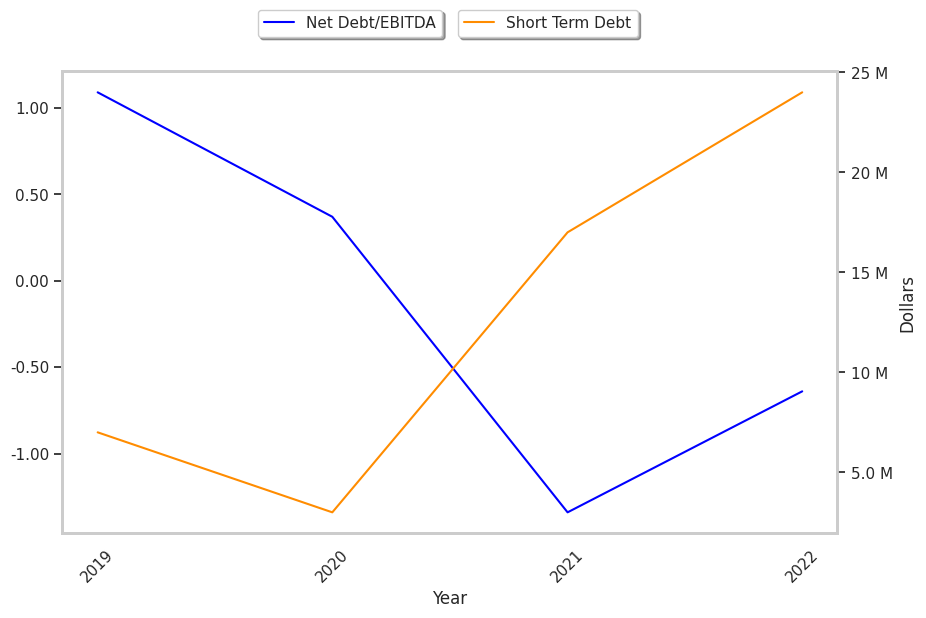Shares of Corteva (CTVA) jumped 0.5 % during today's afternoon session, bringing their 52 week performance to -17.0%. The stock seems to be fairly valued in terms of traditional metrics, but in this day in age, we believe that a complete stock analysis should also take into account the company's mixed growth prospects and positive market sentiment.
Corteva, Inc. operates in the agriculture business. The large-cap Industrials company is based in Indianapolis, United States and has 21,000 full time employees.
CTVA Has a Higher P/E Ratio Than the Sector Average
Compared to the Industrials sector's average of 20.49, Corteva has a trailing twelve month price to earnings (P/E) ratio of 31.7 and an expected P/E ratio of 15.1. The P/E ratios are calculated by dividing the company's share price by its trailing 12 month of $1.57 or forward earnings per share of $3.3.
Earnings represent the net profits left over after subtracting costs of goods sold, taxes, and operating costs from the company's recorded sales revenue. One way of looking at the P/E ratio is that it represents how much investors are willing to pay for every dollar's worth of the company's earnings. Since Corteva's P/E ratio is higher than its sector average of 20.49, we can deduce that the market is overvaluing the company's earnings.
Corteva Is Fairly Valued in Terms of Expected Growth
Another factor pointing to Corteva's value is its PEG ratio of 1.77. This is the stock's price to earnings ratio divided by its estimated earnings growth rate. If the resulting ratio is near or lower than 1 -- but higher than 0 -- its indicates that the company is faitly valued in terms of expected growth.
CTVA Has an Average P/B Ratio
Traditionally, stock pickers used to focus primarily on finding issues that were trading significantly below their tangible asset value, to guarantee themselves a margin of safety. But such an approach would screen out many valuable securities because many profitable businesses -- especially those that heavily leverage information technology -- simply do not have many tangible assets compared to more capital intensive companies.
Therefore, modern value investors tend to focus less on absolute price to book value (P/B) ratios. Instead of singling out stocks with a P/B ratio of less than 1, they will compare the target company against its peer group. For Corteva, the P/B value is 1.35 while the average for the Industrials sector is 3.78.
CTVA's Weak Cash Flow Generation Is Troubling
The table below shows that Corteva is not generating enough cash. A well run company will generally have cash flows that reflect the strength of its underlying business, and in Corteva's case, free cash flow is growing at an average rate of 0.0% with a coefficient of variability of 117815121721.7%. We can also see that cash flows from operations are evolving at a 0.0% rate, versus 0.0%:
| Date Reported | Cash Flow from Operations ($ k) | Capital expenditures ($ k) | Free Cash Flow ($ k) | YoY Growth (%) |
|---|---|---|---|---|
| 2023-02-09 | 872,000 | -605,000 | 1,477,000 | -54.72 |
| 2022-02-10 | 2,689,000 | -573,000 | 3,262,000 | -1.15 |
| 2021-02-11 | 2,727,000 | -573,000 | 3,300,000 | 52.85 |
| 2020-02-14 | 996,000 | -1,163,000 | 2,159,000 |
Corteva Is Not a Profitable Business
If you are looking to make CTVA a long term investment, its weak margins may give you cause for concern. As you can see from the below, the company is generally losing money on each sale it makes. That being said, stock prices in the short term can be independent of a company's margins, and Corteva's management may be able to make the business profitable in the future.
Corteva's Gross Margins
| Date Reported | Revenue ($ k) | Cost of Revenue ($ k) | Gross Margins (%) | YoY Growth (%) |
|---|---|---|---|---|
| 2023-02-09 | 17,455,000 | -10,436,000 | 40 | -2.44 |
| 2022-02-10 | 15,655,000 | -9,220,000 | 41 | 2.5 |
| 2021-02-11 | 14,217,000 | -8,507,000 | 40 | 5.26 |
| 2020-02-14 | 13,846,000 | -8,575,000 | 38 |
Corteva's Operating Margins
| Date Reported | Total Revenue ($ k) | Operating Expenses ($ k) | Operating Margins (%) | YoY Growth (%) |
|---|---|---|---|---|
| 2023-02-09 | 17,455,000 | -5,091,000 | 11 | 37.5 |
| 2022-02-10 | 15,655,000 | -5,118,000 | 8 | 33.33 |
| 2021-02-11 | 14,217,000 | -4,867,000 | 6 | 50.0 |
| 2020-02-14 | 13,846,000 | -4,687,000 | 4 |
Corteva's cost of revenue is growing at a rate of -0.0% in contrast to -2.1% for operating expenses. Sales revenues, on the other hand, have experienced a 0.0% growth rate. As a result, the average gross margins growth is 0.1 and the average operating margins growth rate is 28.9, with coefficients of variability of 3.2% and 41.2% respectively.
Corteva Benefits From Positive Market Signals
The market sentiment regarding Corteva is overwhelmingly positive. The stock has an average rating of buy and target prices ranging from $82.0 to $57.0. CTVA is trading -28.06% away from its target price of $69.2. 1.5% of the company's shares are tied to short positions, and 82.9% of the shares are held by institutional investors.
| Date Reported | Holder | Percentage | Shares | Value |
|---|---|---|---|---|
| 2023-06-30 | Vanguard Group Inc | 11% | 79,405,601 | $3,953,207,833 |
| 2023-06-30 | Blackrock Inc. | 8% | 53,977,688 | $2,687,279,188 |
| 2023-06-30 | Capital World Investors | 5% | 38,895,669 | $1,936,420,875 |
| 2023-06-30 | State Street Corporation | 5% | 32,754,056 | $1,630,660,672 |
| 2023-06-30 | Aristotle Capital Management, LLC | 4% | 26,499,125 | $1,319,258,934 |
| 2023-06-30 | Nuveen Asset Management, LLC | 2% | 16,208,185 | $806,924,487 |
| 2023-06-30 | Geode Capital Management, LLC | 2% | 14,988,480 | $746,201,474 |
| 2023-06-30 | Northern Trust Corporation | 2% | 12,178,462 | $606,304,728 |
| 2023-06-30 | FMR, LLC | 2% | 11,952,497 | $595,055,061 |
| 2023-06-30 | Independent Franchise Partners, LLP | 2% | 11,292,296 | $562,186,954 |



